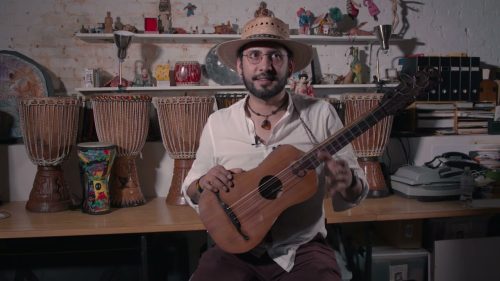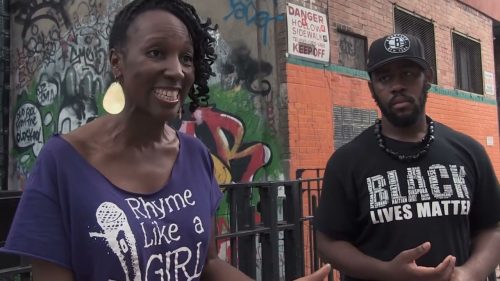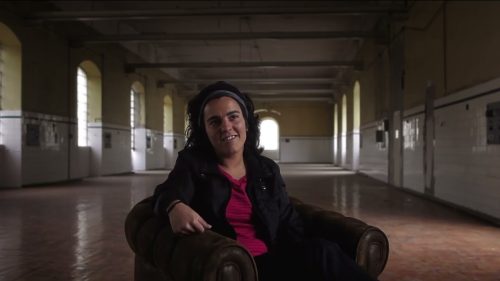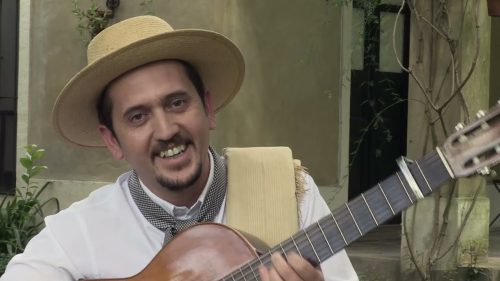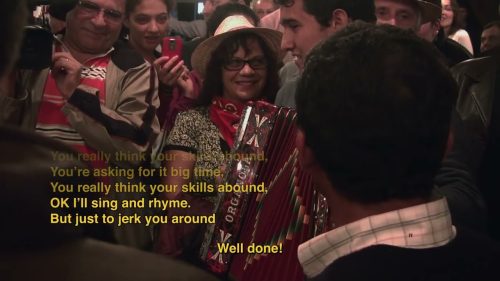A Map of Poetry Duels
- Blue: Documented
- Orange: Documented w/ Lesson
- Red: Media Only
Here’s to improvisation and rhyme.
To the poets that create in real time,
Here’s to on the spot creators,
Not writing it down and saving it for later.
Who perform imagination live.
Caught in the moment, feel the vibe.
Spitting into the wind, suddenly we’re travelin,
Portugal to Trinidad To Kyrgyzstan, Italy, Peru, Venezuela and Pakistan.
When every line is a vibe, when every line is improvised.
Finding yourself within the flow, of a tradition that started long ago.
Be imagination’s best proponent,
Just by … living in the moment.~Toni Blackman and Bob Holman
Table of Contents
About This Web Page
This web exhibit offers an introduction to poetry duels and improvisations, a form of oral literature prevalent in cultures worldwide. In addition, it provides an educational accompaniment to the film, In the Moment: Poetry Duels and Improvisations. It affords background information and resources on the traditions of poetry duels and improvisations, and write ups of 10 additional traditions, including transcriptions from the documentary, field notes describing our work with each form, and selected lesson plans.
The documentary film, In the Moment: Poetry Duels and Improvisations introduces viewers to payadores, emboladores, decimistas, bertsolari poets, extempo and freestyle rap artists from Argentina, Canary Islands, Brazil, Portugal, Italy, Trinidad, the Basque region of Spain, Kazakhstan, Kyrgystan and the U.S. The film features charismatic poets and musicians who are masters of the art of improvisation, dueling with one another and commenting on the meaning of the traditions and of life itself in improvised rhymes. For this initiative, we have featured each tradition featured in the film separately on Youtube. These forms express a range of emotions from personal love and cultural identity, to praise, playfulness and aggression. For 3 (?) of the traditions that lend themselves for classroom use we have provided lesson plans for teachers. Watch the full documentary here.
Trailer for the hour-long documentary, In the Moment: World Poetry Duels and Improvisations.
Poetry Duels and Improvisations
Improvised poetry contests, formal and informal, are found in many of the world’s cultures. As far back at 700 B.C.E, duels were chronicled in ancient Greece. The poet Hesiod describes “eris” or “competition” in song in spiritual terms, enhanced when “potter strives against potter, beggar against beggar, and singer against singer (Works and Days, 8th Century B.C.E., Hirsch 2014). In Hesiod’s Works and Days, c. 700 B.C., a poet claims to have been “the victor in a song contest and won an eared tripod which I dedicated to the Helikonian Muses, where they first taught me mastery of flowing song.”(Trans. Apostolos N. Athanassakis).
In the Arab world, poets duel in the sung oral poetry of the zajal using the vernacular language of the people. With nimble minds, a vast vocabulary, and considerable wit, each poet responds to the other in a traditional rhyming style that first appeared in twelfth-century Islamic Spain (Al-Andalus).
In Alaska and Greenland indigenous groups settle disputes with song duels. The song duels are composed using lampoons, insults and obscenities aimed at opponents and the audience takes sides applauding their favorite until there is a clear winner. In the Eskimo legend of Aaraatuaq, writes Edmund Carpenter in I Breathe a New Song: Poems of the Eskimo (NY: Simon & Schuster, 1971), two enemies, having reviled each other in song through many years, at last become so accustomed to it, so fond of it, they decide to continue their drum fighting after death. Aaraatuaq is the first to die, and when he hears his opponent approach his grave singing, calling him out, he rises from the stones of his grave and sings his drum song standing on the stones, using his shoulder blade as a drum and his leg bone as a drumstick.
In her essay, The Art of Dueling with Words: Toward a new Understanding of Verbal Duels across the World, anthropologist Valentina Pagliai defines poetry duels as a “genre of argumentative language that entails exchanges between two persons, parties or characters that challenge each other to a performative display of verbal skillfulness in front of an audience.” [p. 63]. Beyond a core similarity “verbal duels demonstrate an astonishing heterogeneity of forms around the globe.” [p 64]. Throughout, they display “a heightening of the poetic dimension of language.” [p. 63]
Pagliai notes that much of the writing about Poetry Duels has suggested that they are a vehicle for expressing male aggression. The scholar Max Gluckman called them “rituals of rebellion”. Pagliai argues that it is “crucial to consider the enormous variety of forms of verbal forms of verbal duels across the world, many of which may not deploy insults or at least may not do so most of the time, and are not performed by young people or males.” [p. 63]. While men do dominate many poetry duel traditions, some, such as the Cambodian Ai Yai tradition involve teasing and banter between men and women, and women increasingly excel in many of the male dominated traditions today, such as Calypsonian Lady Africa and Basque Bertsolari singer Maialen Lujanbio. Increasingly, women increasingly play a significant role in contemporary poetry performances of slam and freestyle rap.
Features of Poetry Duels
Although each genre of poetry duels has distrinct rules and verse forms, they often share certain characteristics.
- Declaimed in song to the accompaniment of music
- Often involve boasting, satire, insult
- Exist in purest form in performance. They are improvised on the spot with a live audience that is integral to the event. As such, they are ephemeral, like material forms such as rangoli, or alpina designs drawn daily with powdered spices and flower on the thresholds of Indian and Bangladeshi homes.
- Engage the audience which often serve judges. Both through applause and traditional responses that encourage a poet or signal that it is time to move on, the audience is engaged. In some traditions such as the decima found in many Latin American cultures, the audience offers a pied forzado, a poetic line which provides word or phrase that poet must improvise on. In many cultures such as Trinidadian extempo and Brazilian emboladas audience members often become the subject of the poet’s verse.
- Involve verbal insults on common topics. These include looks, clothing, skill, age, social status, and sexuality. Other topics include the role of the poet in society, plight of poet’s life or lives of the poor or common people, missing the homeland, feelings of being displaced, politics, and legendary characters.
- Follow agreed-upon rules for what constitutes acceptable topics and what is off-limits.
- Utilize oral formulaic composition.Often poetry duels use many of the kinds of standardized phrases, lines, nonsense syllables and stock metaphors as memory tools. They exemplify the process identified by Parry and Lord with their work on Yugoslavian epic poets, applying it to Homer and recited Greek epics.
- Take place in informal community settings. Examples are street corners, bars, and public plazas. Increasingly they take place at festival events, such as carnival in Trinidad.
- Demonstrate skills including the ability to rhyme within confines of a rhyme scheme (ie, decima) and verse form. In some traditions dueling poets trade lines back and forth (Cuban, Panamanian) In others, each composes a full verse (decimal).
- Showcase not only not only the poet’s verbal dexterity and their skill in attacking their opponent, but also in their ability to maintain their composure in response to their opponent’s attacks. Strategies include putting down opponent; testing opponent’s ability to maintain composure or presence of mind in the interaction; and pushing opponent into defensive role by overplaying the implications of his or her argument. Another favorite approach is to say that the opponent’s argument is old and audience too intelligent to buy it, or berate opponent for evading an issue or missing the point.
- Highlight the poet’s role as provocateur, social commentator, and voice of common people.
Improvising in all cultures requires a depth of knowledge to draw upon.Trinidadian exempo artist, Hollis “Chalkdust” Liverpool made this point when he recalled an improvised Calypso picong that Calypsonian Executor threw at Atilla:
I admire your ambition you’d like to sing
But you’ll never be a Kaiso king.
To reach such a height without blemish or spot,
You must study Shakespeare, Byron, Milton and Scott.
Common Settings and Contexts for Poetry Duels
Often, poetry duels take place in three different kinds of performance contexts:.
in informal arenas such as bars, social clubs and barber shops; on street corners, beaches and plazas as street performance, often for tips; and as part of heritage and music celebrations in formal festivals.
Each of these settings harbors a different relationship between the performer and the audience, and among the performing artists. Many performers are comfortable in all three. Traditions that begin in informal settings often evolve into street performances and, later, become part of folk and heritage festivals. For example, the Feiras Novas festival in Ponte de Lima, in northern Portugal has been taking place since the year 1125, and poetry duels have been taking place on the streets for much of that time – yet the formal desafio with improvised poetry contestants was instituted at the festival in the early 2000s.
Hollis Liverpool is a nine-time winner of Trinidad’s Calypso Monarch competition. He also holds a Ph.D. in history and ethnomusicology from the University of Michigan. In his memoir, From the Horse’s Mouth, he offers a wonderful example of improvised Trinidadian extempo as street performance. “’Hustling’ was so called because of the art, guts, expertise and energy it took to jostle the tourists in order to make a living out of calpso singing. ‘Hustling,” which still goes on today, has always been the part-time occupation of most singers from as early as 1920. It means understanding the world news and events of the day, arming oneself with a guitar or cuatro, learning a few outstanding calypso compositions and rhythmical oratorical lines, and then entertaining guests and patrons by singing notable calypsos and composing ditties extemporaneously on events taking place.
“A favorite trick in hustling is to know the lines by rote, but change a few words to make the listener feel that it is being done extemporaneously. For example, a favorite of the hustlers goes thus:
Welcome my friend! Welcome good man!
Ah glad you come to this sunny land.
Here you’ll find the natives nice,
Beautiful, sensitive, this is paradise.
I do hope you really enjoy your stay,
Drink plenty rum and bathe in Maracas Bay.
Since yuh come here, yuh already looking fat,
So put a five dollar in mi old black hat.”
In many of the examples we have explored, poetry duels documented in rural settings and small villages that nurtured these traditions lean towards invective and merciless ridicule. When the duels move to the stage and are formalized into contests with prizes, sometimes sponsored by their own communities, sometimes by local government agencies, or at national folk festivals, the emphasis seems to switch from good arguers to good talkers, from skill at disarming one’s opponent with invective to outperforming him or her with superior eloquence. In the more formal contexts of large community or government sponsored festivals, the poetry often becomes self-referential, reminding audiences of vernacular poetry’s place in the country’s folklore and national identity, the importance of preserving the tradition. In these contests, we can see the way formalization and institutionalization influences the tradition – and, in a sense, creates new traditions.
Field Notes
Our interest in poetry duels and improvisations goes all the way back to the mid 1970s in our work with the Smithsonian’s Festival of American Folklife. Steve brought two street criers who improvised rhymes at a Washington, DC fish market to the Festival in 1977, and later teamed up with filmmaker Paul Wagner and folklorist Jack Santino create a documentary, Mermaids, Frog Legs and Fillets. In the early 1980s, Amanda created “finding aid #1” for the Archive of American Folksong on American Talkers including medicine show docs, auctioneers and street criers, as part of her research for her dissertation. A few years later she coproduced a film with Susan Slyomovics on Pakistani henna hand painting. The Painted Bride features improvised songs created and sung by the bride’s friends making fun of the groom and his family and the groom’s family responding, teasing one another with improvised verses based on popular songs.
In 1999, City Lore collaborated with Poets House to launch the People Poetry Gathering. The Gathering was a biennial event that brought together diverse audiences not only to witness stunning performances, but also to galvanize public attention around issues of preserving cultural forms and languages. During these festivals in 1999, 2001, 2003, and 2006, Lower Manhattan was transformed into a poetry village for three days. In 1999, the Gathering highlighted the pan-Latin decima tradition from Columbia, Brazil, Mexico, and Puerto Rico, along with some of the new U.S. poetic forms and formats such as freestyle improvised rap. In 2001, the Gathering highlighted a number of competitive Asian traditions in the U.S. including the Filipino-American balagtasan genre of traditional poetry debates. The Yemeni balah tradition of competitive improvised verse was highlighted at our 2004 Yemeni dinner and the Basque bertsolari tradition at the 2006 Gathering. The zajal poetry dueling tradition from Lebanon was presented at Illuminated Verses: Poetries of the Islamic World.



